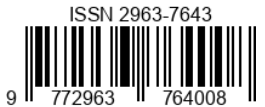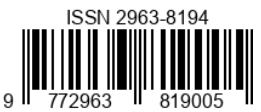Strategi Untuk Mengendalikan Inflasi Menurut Perspektif Ekonomi Islam
DOI:
https://doi.org/10.55606/jekombis.v3i3.3965Keywords:
inflation, controlling inflation, Islamic economicsAbstract
Inflation is an economic issue that is often discussed in Indonesia. Where inflation is an economic phenomenon that involves an increase in goods and services in the world economy. However, in the context of Islamic economics, inflation is not just a difference in prices, but leads to ethical and social differences that violate sharia principles. Indonesia has made various efforts to control inflation, including controlling supply and demand, stabilizing prices of daily necessities, and regulating monetary and fiscal policies. This research aims to find out strategies for controlling inflation according to Islam. This research uses a qualitative approach using systematic literature review (SLR) techniques. to control inflation according to Islamic economics. This fiscal policy includes state spending for the public interest, taxes and loans to stabilize the national economy and public welfare, or is controlled by sharia money, namely by avoiding the use of instruments based on usury, gharar, maisyir and zhulum. Islamic economics as an economic system has its own methods and strategies for controlling inflation which are very different from other economic systems. Islamic economics accepts monetary and fiscal policy as part of efforts to control inflation. However, to achieve standards of socio-economic justice, efforts need to be made to maintain price stability through strategies of moral improvement, equal distribution of income and wealth, and the elimination of usury.
Downloads
References
Ardiansyah, H. (2023). Pengendalian inflasi dalam sistem ekonomi Islam. Jurnal Ekonomi, Keuangan, Perbankan, Akuntansi, 2(1), 35-46.
Bintara, Y. P., & Wahyudi, A. (2023). Mekanisme pengendalian inflasi: Pendekatan Islam dalam memelihara stabilitas harga. Jurnal Masharif Al-Syariah: Jurnal Ekonomi dan Perbankan Syariah, 8(3).
Budi, T., & Muhammad, A. B. (2021). Transmisi kebijakan moneter syariah di Indonesia: Review literatur. Al-Amwal : Jurnal Ekonomi Islam, 10(2), 177–191.
Fajar, D. A. (2021). Kajian perbedaan time value of money atau economic value of time dalam perspektif syariah. Jurnal Ilmiah Ekonomi Islam, 7(03), 1435–1440.
Hariyanto, M. (2019). Perspektif inflasi dalam ekonomi Islam. Al-Mizan: Jurnal Ekonomi Syariah, 2(2), 79–95.
Naqiyya, A. N., et al. (2023). Pengendalian inflasi di Indonesia perspektif M. Umer Chapra. Istithmar, 7(1), 50–65.
Salam, W. R. (2020). Inflasi ditengah pandemi dalam perspektif Islam. Jurnal Syntax Transformation, 1(5), 187–192.
Samsul, N. M. H., & Nasution, H. G. (2019). Sistem pengendalian inflasi dalam sistem ekonomi Islam. Al-Azhar Journal of Islamic Economics, 1(1), 16–28.
Simanungkalit, E. F. B. (2020). Pengaruh inflasi terhadap pertumbuhan ekonomi di Indonesia. Journal of Management: Small and Medium Enterprises (SMEs), 13(3), 327–340.
Tambunan, K., & Suhardi, A. A. (2022). Cara mengatasi inflasi untuk meningkatkan pertumbuhan ekonomi di Indonesia berdasarkan perspektif ekonomi Islam. Jurnal Studi Ilmu Keagamaan Islam, 3(1), 32.
Yuliono. (2017). Time value of money dalam. El Jizya (Jurnal Ekonomi Islam), 5(1), 177–192.
Downloads
Published
How to Cite
Issue
Section
License
Copyright (c) 2024 Jurnal Penelitian Ekonomi Manajemen dan Bisnis

This work is licensed under a Creative Commons Attribution-ShareAlike 4.0 International License.







